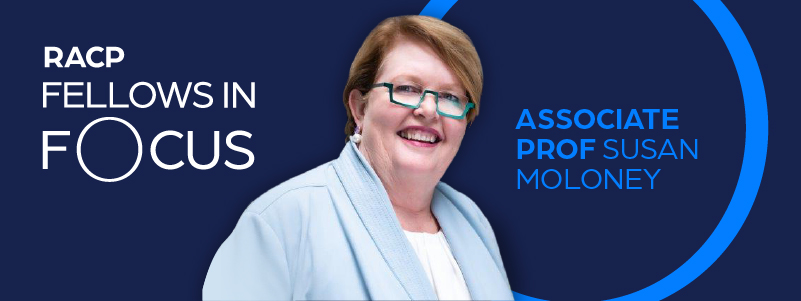RACP Fellows in Focus: A/Prof Susan Moloney
Date published:
31 May 2021

“I grew up in a rural setting and I had a rural scholarship. For my first three years following medical school, I worked in a number of regional hospitals around Queensland and I enjoyed the generalism, but didn't feel I wanted to be a GP,” shared Professor Susan Moloney.
“I probably only decided to do paediatrics in my second or third postgraduate year. I liked that paediatrics covered a broad range of conditions and it didn't put me down a tiny rabbit hole, where I'm looking for a specific condition or disease. It meant that I had flexibility about where I could work, I wouldn't just be in a big city hospital. I could be working in a number of different locations and I enjoyed the regional rotations because I had a bit more autonomy in decision making.”
Susan is a past-President of the RACP’s Paediatrics & Child Health Division, a previous RACP Board Director and her long list of achievements in medicine are extensive.
Currently the Director of Paediatrics at the Gold Coast University Hospital, Queensland, she is also an Associate Professor, School of Medicine at Griffith University and Honorary Adjunct Professor, Faculty of Health Sciences and Medicine at Bond University and was involved in the development of both of those medical schools. Furthermore, she is also a pre-eminent Staff Specialist.
Susan has been a clinical network chair for Queensland Health and chaired the infant mortality subcommittee for the state from 2001 to 2006. She’s been on many other state-wide committees and taskforces. She was a member of the Independent Health Advisory Panel (Medevac panel) for the Commonwealth Minister for Home Affairs from April to December 2019. She has been an examiner for the Indonesian College of Pediatrics. Additionally, Susan does overseas volunteer work for Operation SMILE, a worldwide children’s charity organisation that helps treat facial deformities, such as cleft lips and cleft palates.
With such broad experience, how did her involvement at RACP impact her journey? She told us, “after about 12 months of being a specialist, I was on the Council as one of the newly elected members. I’ve always been on some sort of committee with the College, whether it's at state national or international level. I've really enjoyed it and I think it's kept me sane in many ways.”
Her skills as a medical practitioner have stood her in good stead for dealing with the multitude of problems that arise during the working day, but she mentioned that regardless of the skills of the individual, you always have to remember you’re one part of a larger, constantly evolving organism, “I think listening to people and reflecting on what they're saying, realising that you can't do it alone, you need to be part of a team, that is, respecting each other and supporting the team. I don't think there's any speciality where you can do it alone, and in paediatrics, you definitely can’t.”
“Doing the College work got me out of the challenges in the workplace and kept me sane from that point of view, but at times I was probably doing too much. I was designing and moving a hospital while I was President of the Paediatrics & Child Health Division and organising an international conference. So that was probably silly in retrospect, but in fact, the busier you become, the more organised you get.”
For those looking to tread in the footsteps of Susan, she offered this advice, “I encourage people to get involved in College activities to learn some of those leadership skills. If you're involved in the College, you can start to learn how to do some effective advocacy work as well. There are lots of opportunities and going in different directions is actually a good thing.”